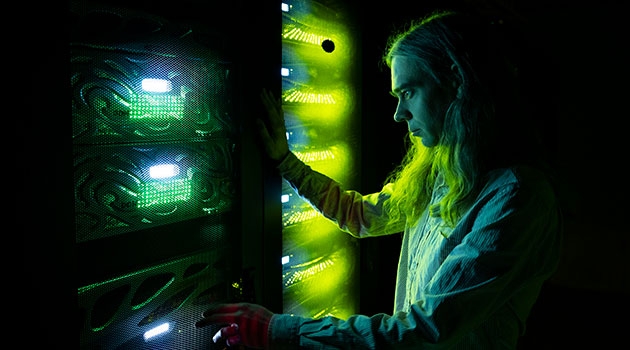Uppmax and Akademiska Hus adapt electricity power demand

Carl Nettelblad is adjusting the electricity consumption in the Uppmax computer hall.
Between 2020 and 2022, a climate pot of SEK 2 million was allocated by the Vice-Chancellor. Uppsala Multidisciplinary Centre for Advanced Computational Science (Uppmax) received some of this money in 2022 to dynamically adapt electricity consumption in its computer hall. Work is now under way in collaboration with Akademiska Hus.
Uppmax is Uppsala University's resource of high-performance computers, large-scale storage and know-how of high-performance computing (HPC). They received SEK 227,000 to adjust the electricity consumption in the Uppmax computer hall.
Carl Nettelblad from the Department of Information Technology applied for funds from the climate pot on Uppmax’s behalf. He explains:
“We applied for funding to enable us to shut down some of our processing computers when usage is lower, change some default settings to consume less power, and allow users to get an estimate of how much energy their computational work is consuming.”
So far, the project has tested the automatic shutdown and changed some default settings. Nettelblad continues:
“It’s a little like using a laptop where you can choose different power profiles. Traditionally, supercomputers have often been delivered with ‘highest performance’ when in active mode, but we were able to save a few percent by systematically changing the settings.”
A few percent comparable to a few houses
Naturally, it was important to check that there will be a limited impact on the researchers’ computational work. This proved to be mostly the case.
“A few percent may not sound like much,” notes Nettelblad, “but when all the equipment in our computer hall uses around 350 kW in average consumption, a few percent less per year is comparable to several entirely electrically heated houses fewer per year. When electricity prices were at their highest, mainly in December, we also shut down parts of our systems manually.”
Nettelblad and his colleagues enjoy sharing their experiences with colleagues both in Sweden and internationally.
“We want to make more people who work in this area aware of how much electricity can be saved with relatively small funds,” he says.
Protected storage for power outages and stability
A collaboration with Akademiska Hus was not part of the project in the beginning. Now they ensure together that the batteries are used, which is intended to protect Uppmax's large-scale storage in the event of a power outage as well as to support the electricity grid. Solar and wind power are becoming increasingly common on the electricity network and demand is varying more. If changes come suddenly, the frequency of the current may drop in the outlet.
“If the frequency drops too far, the system could collapse,” explains Nettelblad. “Together with Akademiska Hus and their electricity supplier, we want to make our small contribution to the stability of the entire Swedish electricity system. The solution is based in part on us running on battery power if the frequency falls too low.”
The collaboration has also involved knowledge exchange and steps to produce the right agreements. Several parties are involved, including Svenska kraftnät, electricity suppliers, property owners and the Buildings Division. But it is Uppmax that has the equipment.
“Without stability services, it will become difficult to bring in more renewable production on the network,” explains Nettelblad. “Through dynamic reduction in demand in strained situations, the need for fossil-fuelled reserves can be reduced. This helps create an immediate benefit for the climate.”
Ulrika Hurtig
Facts: Uppmax and the climate pot
- UPPMAX (Uppsala Multidisciplinary Center for Advanced Computational Science) is Uppsala University's resource of high-performance computers, large-scale storage and know-how of high-performance computing (HPC).
- The purpose of the climate pot was to reinforce and invigorate Uppsala University’s efforts to reduce its climate impact. Innovation and creativity were particularly encouraged. Employees, students and units at the University were able to apply for a maximum of SEK 250,000 for their respective projects.
